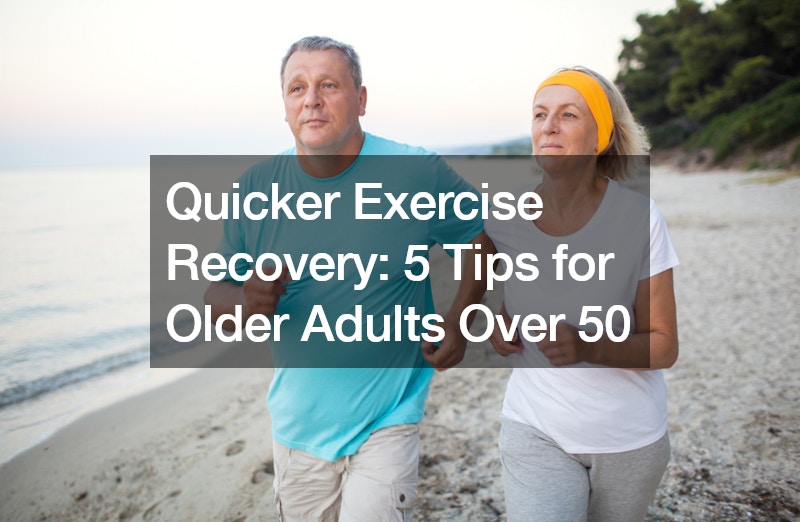
As we age, staying active becomes increasingly important for our overall health and well-being. However, recovery from exercise can take longer as we grow older, requiring more thoughtful strategies to ensure our bodies bounce back effectively. Whether you’re a seasoned fitness enthusiast or just beginning your journey, optimizing exercise recovery after 50 can make a significant difference in how you feel and perform. Here are essential tips to help you enhance your recovery process and get the most out of your workouts.
1. Incorporate Active Rest
Active rest involves engaging in low-intensity activities that promote blood flow and muscle relaxation without placing undue stress on your body. As we age, our muscles may take longer to recover from vigorous exercise, making active rest particularly beneficial.
Activities like walking, swimming, or gentle cycling allow for increased circulation, which aids in the removal of metabolic waste products from muscles while supplying them with essential nutrients.
Moreover, practices such as yoga or tai chi not only support physical recovery but also enhance mental clarity and emotional well-being. These mindful exercises promote relaxation, reduce cortisol levels, and improve sleep quality, all of which are crucial for overall recovery and resilience.
2. Pay Attention to Your Body
Listening to your body is paramount, especially as we age. Muscle soreness or fatigue after a workout is normal, but persistent soreness could indicate that your body needs more time to recover. It’s essential to differentiate between muscle soreness that diminishes within a day or two and prolonged soreness that lasts beyond 72 hours.
Adjust your exercise regimen accordingly; if your body signals the need for rest, take an extra day off or opt for lighter activities until you feel fully recovered. This approach not only prevents injury but also ensures that you can maintain a consistent exercise routine over the long term.
3. Stay Hydrated
Proper hydration is crucial for effective exercise recovery, yet it’s often overlooked. Drinking an adequate amount of water before, during, and after exercise helps replenish lost fluids and flush out metabolic waste accumulated during physical activity. As we age, our sense of thirst may diminish, making it easier to become dehydrated without realizing it. Aim to drink at least two to three liters of water daily, adjusting for your activity level and environment. This simple habit supports optimal muscle function, joint lubrication, and overall health, facilitating quicker recovery after workouts.
For those looking to optimize their hydration levels more precisely, consider IV therapy. Intravenous (IV) hydration therapy delivers fluids directly into your bloodstream, ensuring rapid absorption and immediate hydration benefits. This method can be particularly beneficial for older adults or individuals with specific hydration needs, such as athletes recovering from intense workouts. Mobile IV therapy services bring this convenience directly to your doorstep, offering personalized hydration solutions tailored to your health and fitness goals.
4. Get Enough Sleep
Quality sleep is a cornerstone of effective exercise recovery, particularly for older adults. During sleep, the body releases growth hormones that aid in muscle repair and regeneration. Lack of adequate sleep can hinder these processes, prolonging recovery time and increasing the risk of injury.
Aim for 7 to 9 hours of uninterrupted sleep every night to allow your body ample time to recover and recharge. Maintaining a consistent sleep schedule and creating a relaxing bedtime routine can significantly improve sleep quality, enhancing your overall recovery from physical activity.
5. Maintain a Healthy Diet
Nutrition plays a vital role in supporting exercise recovery and overall health, especially as we age. Consuming a balanced diet rich in lean proteins, fruits, vegetables, and whole grains provides essential nutrients that promote muscle repair, reduce inflammation, and replenish energy stores.
Protein, in particular, is crucial for repairing muscle tissue damaged during exercise, while antioxidants found in colorful fruits and vegetables help combat oxidative stress and accelerate recovery. Avoiding processed foods high in sugar and unhealthy fats is equally important, as these can impair recovery and negatively impact overall health.
In Conclusion
Optimizing exercise recovery after 50 requires a combination of mindful strategies tailored to your body’s changing needs. By incorporating active rest, listening to your body’s cues, staying hydrated, getting sufficient sleep, and maintaining a nutritious diet, you can speed up your recovery and maximize the benefits of regular physical activity. These practices not only support muscle repair and recovery but also contribute to better overall health, keeping you active, resilient, and energized as you continue to enjoy an active lifestyle during your golden years. Incorporate these tips into your fitness routine and experience the difference they make in your exercise recovery and overall well-being.
.

